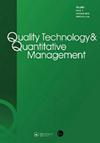An improved risk and reliability framework-based maintenance planning for food processing systems
IF 3
2区 工程技术
Q3 ENGINEERING, INDUSTRIAL
Quality Technology and Quantitative Management
Pub Date : 2022-07-03
DOI:10.1080/16843703.2022.2093565
引用次数: 3
Abstract
ABSTRACT In food processing systems, it is necessary to evaluate the risk process and reliability in order to prevent unexpected events and control functional safety through well-planned maintenance. This study examines risk and reliability models and develops their theories using a novel framework based on failure behavior trends. The proposed framework was implemented in edible oil industries, specifically purification processes, and consists of three steps: first, identifying potential failures using risk-based approaches such as Failure Mode and Effect Analysis (FMEA) and Fault Tree Analysis (FTA); second, adapting a statistical structure consisting of homogenization survey and validity of identity and independence; and finally, estimating the failure rate and reliability to find the suitable maintenance intervals. The findings revealed that the proposed framework is capable of identifying critical equipment with high failure rates as the most important bottlenecks in edible oil processing lines, allowing maintenance plans to be carried out based on the various levels of reliability. Furthermore, opportunistic maintenance intervals were suggested due to the series configuration of equipment in such a process. As a result, the findings of this study may be useful in improving process safety and availability in the food processing industry.改进的基于风险和可靠性框架的食品加工系统维护计划
摘要在食品加工系统中,有必要评估风险过程和可靠性,以防止意外事件的发生,并通过有计划的维护来控制功能安全。本研究考察了风险和可靠性模型,并使用基于故障行为趋势的新框架来发展其理论。所提出的框架在食用油行业,特别是净化过程中实施,包括三个步骤:首先,使用基于风险的方法,如故障模式和影响分析(FMEA)和故障树分析(FTA),识别潜在故障;第二,采用由同质化调查和同一性和独立性有效性组成的统计结构;最后,估计故障率和可靠性,以找到合适的维修间隔。研究结果表明,拟议的框架能够将故障率高的关键设备确定为食用油加工线中最重要的瓶颈,从而能够根据不同的可靠性水平执行维护计划。此外,由于在这样的过程中设备的串联配置,提出了机会维护间隔。因此,这项研究的结果可能有助于提高食品加工行业的工艺安全性和可用性。
本文章由计算机程序翻译,如有差异,请以英文原文为准。
求助全文
约1分钟内获得全文
求助全文
来源期刊

Quality Technology and Quantitative Management
ENGINEERING, INDUSTRIAL-OPERATIONS RESEARCH & MANAGEMENT SCIENCE
CiteScore
5.10
自引率
21.40%
发文量
47
审稿时长
>12 weeks
期刊介绍:
Quality Technology and Quantitative Management is an international refereed journal publishing original work in quality, reliability, queuing service systems, applied statistics (including methodology, data analysis, simulation), and their applications in business and industrial management. The journal publishes both theoretical and applied research articles using statistical methods or presenting new results, which solve or have the potential to solve real-world management problems.
 求助内容:
求助内容: 应助结果提醒方式:
应助结果提醒方式:


